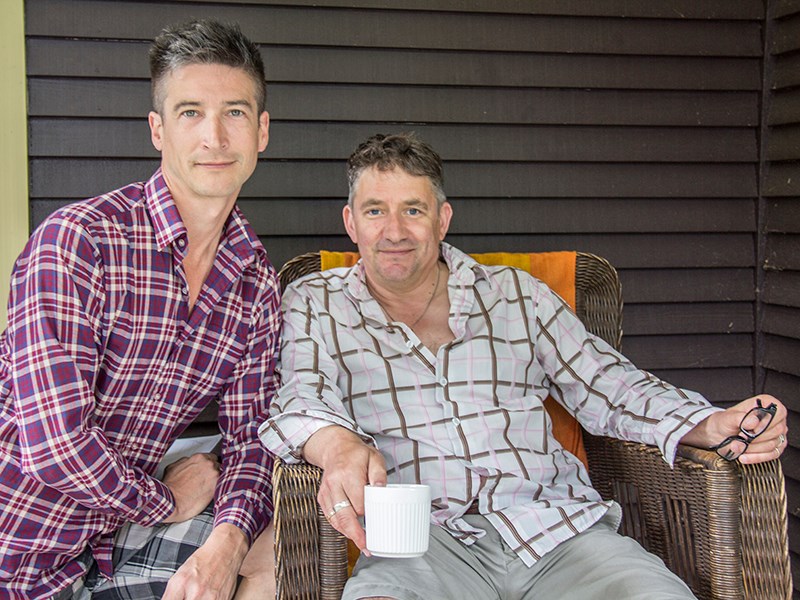Over and over, one of many sentiments expressed, according to lesbian, gay, bisexual and transgender people (LGBT) who live in Powell River, is that this community is very accepting of them.
For many, it is a thought that gives rise to a simple question, but one that is difficult to answer: why?
Why is a small LGBT community living in a blue-collar town with a significantly aging population and strong religious presence, groups not traditionally seen as allies, so at ease and accepting?
“There’s this kind of magic about Powell River, about people making the choice to live here,” said Lyn Adamson, executive director of Powell River Employment Program Society, which administers Powell River Diversity Initiative. “Some people kick and scream to get here and then carve out a life. I think people really want to be here and appreciate that other people might want to be here; that makes you more tolerant of everyone around you.”
Arguably, the most public and recognizable gay couple in the city is Powell River-Sunshine Coast MLA Nicholas Simons and his partner of 14 years, Slim Milkie.
“There’s a practicality to existence in a smaller community,” said Simons. “We have to rely on each other. We’re in this together. The unique geographic location calls out for being neighbourly.”
According to David Roundell, historic events of years past brought an openness from outside to the isolation of Powell River.
Now 65, Roundell was 20 years old when he witnessed and was part of the seminal years between 1967 to 1969, a time of social upheaval in North America and the beginning of the gay movement.
In 1967, the summer of love introduced hippies, sexual freedom and the counterculture. It was also the year former prime minister Pierre Trudeau said the state has “no right or duty to creep into the bedrooms of the nation.” That quote was prefaced with a specific reference to homosexual rights.
Two years later the Stonewall riots, a series of demonstrations by members of New York’s gay community in response to a police raid marked the beginning of the gay liberation movement. That same year, the Vietnam War draft lottery began in the United States, confrontations took place between students and authorities on university campuses, and tens of thousands of draft dodgers and war resisters emigrated to Canada. Many of them came to Powell River, where their influence of openness and inclusiveness remains.
“Claudia Medina did a film about diversity in Powell River,” said Roundell, who moved to Powell River three years ago with his partner of 35 years.
“What struck me in that film was the interview with the minister of the Unitarian Church,” said Roundell, “where he said, ‘What changed the mindset up here was the draft dodgers.’ When the draft dodgers came up from the states with more of an expanded view of humanity and a different way of looking at things, it was inevitable that it would seep into the general mindset of the town because we’re isolated up here.”
Even before those events of the modern gay movement, for thousands of years two-spirited people have been recognized in first nations communities, according to Tla’amin Nation resident Anthony Williams.
“In the past, gay people were referred to as two-spirited individuals,” said Williams. “We were held in very high regard in not only mine, but in first nations communities around the coast.”
Williams said he is definitely accepted within his community but there are still one or two close-minded individuals, “but I guess it doesn’t really matter where you are in the population, they’re always there,” he said.
According to Williams, the inclusion of two-spirited people in the LGBT community is an important recognition of a person who is gay, lesbian or transgender within first nations communities.
“It reflects our cultural way of thinking from way back then and how we were never that ignorant in that sense,” he said. “Someone who was different was accepted. We’re just seen as individuals and equal people within the community.”
Roundell said his generation created modern day Pride and the idea of Pride has become something more prominent in big cities.
“Pride is a huge thing in big cities because that’s the catalyst for getting together in one spot,” he said. “Otherwise, I think being gay is pretty fractured right now, whereas when we were coming out it was community, it was your safety, it was our everything.”
Now, according to Roundell and others in the small-town LGBT community, Pride is more about pride in Powell River and its acceptance of diversity.
Adamson said it is a sense of inclusion that is being celebrated, not just LGBT.
“There should be celebrations for all types of diversity,” she said. “We should have a party every weekend to celebrate everything from women, to youth, to seniors, to first nations, to immigrants. Until we can all stand hand in hand, that’s when we’ll truly be inclusive. The question about Pride is good, but it’s not enough. We need to be celebrating all types of diversity, not just once a year.”
The LGBT community will celebrate their inclusion in Powell River with a week of events beginning Monday, August 1, and running through to Sunday, August 7.
For more information, go to facebook.com/prpride.



